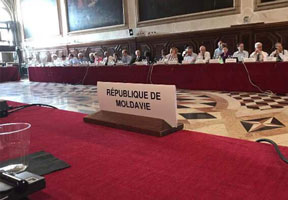Politics
VENICE COMMISSION GIVES CRITICAL ASSESSMENT OF BILLS ON CHANGING MOLDOVAN ELECTORAL LEGISLATION

The Venice Commission of the Council of Europe gave a critical assessment to the bills on changing the electoral system in Moldova and on investing the President of Moldova with additional plenary powers. The Commission formulated their opinion in a press release on the results of their sitting held on June 16 called: “Moldova: Plans to reform the electoral system and presidential powers critically assessed by the Venice Commission”.
Proposed reform to the electoral system had been submitted for opinion by Andrian Candu, Speaker of the Moldovan Parliament, who attended the plenary session for an exchange of views before the adoption of a joint opinion by the Venice Commission and the OSCE Office for Democratic Institutions and Human Rights (OSCE/ODIHR).
The Commission wrote in the press release that following extensive public consultations with all relevant stakeholders, the joint opinion concluded that the proposed reform cannot be considered as having been adopted by broad consensus. It raises “significant concerns” including the risk that constituency members of parliament would be vulnerable to being influenced by business interests.
The document further held that, according to the joint opinion, “the responsibility vested with the Central Election Commission (CEC) to establish single-mandate constituencies for the majoritarian component is based on vague criteria that pose a risk of political influence on this aspect of the work of the CEC.”
Other concerns in the opinion include the following: “Detailed and comprehensive criteria for the establishment of constituencies for Transnistria and for citizens abroad are not stipulated, and proposed changes are unlikely to enhance the representation of women and minorities in the Parliament, and no additional special measures are introduced to compensate for this.”
According to the document, the Commission did not recommend changing the existing electoral system in the absence of a broad political consensus in Moldova.
Regarding the proposal to amend Article 85 of Moldova’s Constitution, which would provide the office of the President additional powers to dissolve Parliament, the Venice Commission opinion found that it could be interpreted as creating excessive executive power to use dissolution as a tool for “party politics,” under the current parliamentary regime.
The Venice Commission opinion, which had been requested by Moldovan President Igor Dodon, also points out that two wrongs don’t make a right, in that the proposal “opposes to the broad potentially discretionary power of Parliament, an equally broad discretionary power of the President, which would open the way to institutional conflicts.”
























Add Comment